Summer Reading Project, BookLikes Satellite
Never stop reading. (Content originally posted at Blogger.)
The Bear and the Nightingale, by Katherine Arden
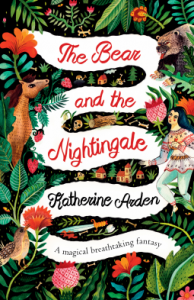
In The Bear and the Nightingale, by Katherine Arden, creatures and characters from Russian folklore barge into ordinary life and wreak havoc for Vasilisa Petrovna. Fittingly, the novel opens with a story about Morozko, the winter-king, who rewards the brave with riches but allows the cowardly and selfish to freeze. Russian folklore pulls no punches...
Read the rest of my review at A Bookish Type. I received a free copy of this book from NetGalley for review consideration.
 1
1
The Second Mrs. Hockaday, by Susan Rivers

Placidia only knew her future husband for 48 hours before she married him. They met when he bought a mule from her father and fell in fascination (if not love) dancing at her step-sister’s wedding. But the new Mrs. Hockaday is separated from her new husband when he is summoned back to Stonewall Jackson’s regiment two days after the wedding. They two of them remain apart until the end of the Civil War. The Second Mrs. Hockaday, by Susan Rivers, is told in letters and documents as others try to figure out what happened during the Hockadays’ separation, Placidia’s trial for infanticide, and the aftermath...
Read the rest of my review at A Bookish Type. I received a free copy of this book from NetGalley for review consideration.
 1
1
The Girl in Green, by Derek B. Miller

Like divine revelation, quests aren’t usually something we see in this day and age. That sort of thing belongs to Arthur’s knights or poor old Don Quixote. At least, that’s what I would have thought before I read Derek B. Miller’s The Girl in Green. The novel follows the serio-comic adventures of Arwood Hobbes, as seen by Times journalist Thomas Benton...
Read the rest of my review at A Bookish Type. I received a free copy of this book from NetGalley for review consideration.
The Color Purple, by Alice Walker
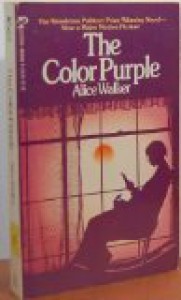
Alice Walker’s The Color Purple has a reputation. Everyone someone asked what I was reading this week, they mostly responded with an appalled, “Why?” The book (and the movie) has cut such a swath across American culture that even people who haven’t read the novel know that it’s about terrible abuse and suffering. And yet, I chose to read it. It’s a classic of African American literature, but I think I read it just to find out what all the fuss was about...
Read the rest of my review at A Bookish Type.
 1
1
Mãn, by Kim Thúy
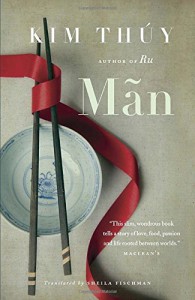
There are some writers who make me think of the way painters work more than anything else. These kind of writers are not so much interested in plot as they are about building up characters or settings with layers of small details like Seurat or Monet. And, just like Impressionist paintings, books by painterly writers have to be viewed both closely and from a distance. Looking closely reveals details about how the writer is working; looking from a distance provides context. Without both perspectives, the meaning of the work gets lost. I’ve been thinking about this metaphor (which I know still needs work) since I finished reading Kim Thúy’s Mãn (translated by Sheila Fischman) last night. The novel is composed in very short chapters, most of them vignettes, that cover the life of the eponymous protagonist. These chapters reveal tensions in culture, gender, history, love, family, and fidelity...
Read the rest of my review at A Bookish Type.
 1
1
A Passage to India, by E.M. Forster
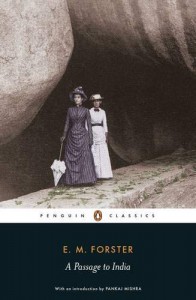
Forster’s 1924 classic, A Passage to India, is a bitingly caustic look at race relations in British India. Anyone with any knowledge of the British Empire will know that the average British attitude towards any indigenous person in the colonies was a blend of condescension, racism, and paternalism. All of these attitudes are on display in varying intensities in this novel, along with the attitudes of the Indians (anger, frustration, hatred, occasionally aspirational). Two Englishwomen arrive in Chandrapore (fictional) to “see the real India” only to find two entrenched camps of people who are civil on the surface but absolutely loathe each other. One of the women causes a legal incident that threatens to destabilize the entire city—and offering us readers a chance to see what happens when someone throws a metaphorical matchstick on dry tinder...
Read the rest of my review at A Bookish Type.
 1
1
The Book Collector, by Alice Thompson
I’m very glad I follow Australian reader Sophie Carlon. Without her recommendation, I would have missed the delightfully chilling The Book Collector, by Alice Thompson. And this would have been a great shame because Thompson’s brief novel captures some of the feel of Angela Carter, who I adore for the ways that she plays with the conventions of fairy tales. The Book Collector is another dark fairy tale come to life in which an innocent woman discovers that her husband is a monster...
Read the rest of my review at A Bookish Type.
The Magician's Land, by Lev Grossman
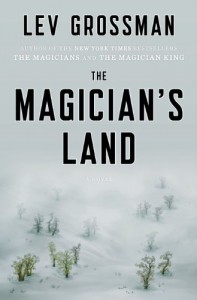
Lev Grossman’s The Magician’s Land is a satisfying and cathartic conclusion to a very smart fantasy series. On the surface, the series is about a group of magically gifted people who discover that the setting of their favorite childhood stories is real. They become high kings and queens of the land, have adventures, and play with magic. One layer down, it’s about a group of very talented people who have serious personality and self-esteem issues who have too much power. One layer below that, as we learn in The Magician’s Land, it’s about a group of very sensitive and intelligent people who’ve had their hearts broken by their parents and have no good models for how to be adults. All of the books center on Quentin Coldwater, more or less, who embodies all of these problems more than any of his friends...
Read the rest of my review at A Bookish Type.
The Small Backs of Children, by Lidia Yuknavitch
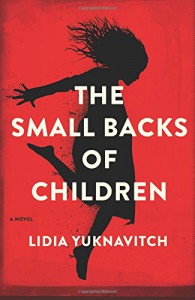
Every now and then, I run across a book that I can’t explain to other people. With books like these, the experience of reading it is more important than the plot or the characters. I still try, of course, but my attempt to talk about the book usually just ends up as a garble from a book-mad librarian. All this is a preface to Lidia Yuknavitch’s The Small Backs of Children. Even 24 hours after I finished the novel, I’m not entirely sure I know what really happened in this book. What really happened is not the important thing. Instead, the important thing is what you feel as this book swallows itself, over and over, like an ouroboros...
Read the rest of my review at A Bookish Type.
The Obelisk Gate, by N.K. Jemisin

I’ve been enjoying the recent trend in fantasy literature that explores what happens after—after the big bad is defeated, after a major disaster. In addition to making all those political philosophy classes I took in college relevant at last, books like N.K. Jemisin’s The Obelisk Gate offer a glimpse into a moment when survival meets idealism. When you’re scrabbling to find enough for your family to eat, is there time to fight a larger battle for equality?
Read the rest of my review at A Bookish Type.
 2
2
Unmentionable, by Therese Oneill

I’ll admit that I was suckered in by the reviews of Therese Oneill’s Unmentionable: The Victorian Lady’s Guide to Sex, Marriage, and Manners. How could I resist a book about Victorian life told with non-stop snark? Reading Unmentionable is a lot like sitting down with a hilarious friend who just went on a Victoriana kick and now wants to tell you the highlights of what they found. Unfortunately, Oneill uses the second person (why am I finding so many of these lately?) throughout the book and most of what she relates is par for the course. I would only recommend this book to people who haven’t read much social history about the Victorian era and want some background on the Victorian mindset in an easy-to-read format...
Read the rest of my review at A Bookish Type.
 1
1
The Crimson Petal and the White, by Michel Faber
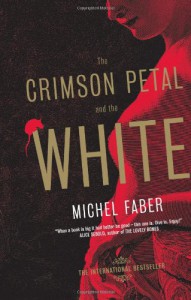
In spite of one irritation, the massive The Crimson Petal and the White by Michel Faber turned out to be a good book to take with me on my travels this week. The rich setting and even richer characterization of the novel were so captivating that I was able to drown out the noise of planes, the other passengers, and my own discomfort at being stuffed into a flying bus with too small chairs. Instead of all that, I was treated to a sprawling Victorian novel that explored lust, madness, neglect, hypocrisy, selfishness, altruism, prostitution, and religion. Faber’s characters are set up in opposition to each other so that, while they interact with each other, you get a chance to ponder how social status and life can push people into divergent trajectories...
Read the rest of my review at A Bookish Type.
 1
1
The Orchardist, by Amanda Coplin
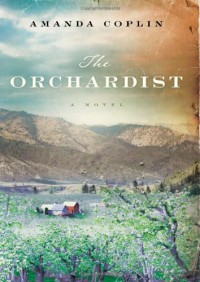
So many novels and movies end with whoever needs to be saved, saved. The bad guys are defeated. The challenge accepted and conquered. The ending gives us closure and the hope that everything will be okay, like a more grownup “happily ever after.” Amanda Coplin’s The Orchardist, a moving and melancholy novel, asks what happens if the person in need of saving cannot be saved despite the best efforts of the would-be savior...
Read the rest of my review at A Bookish Type.
A Fierce and Subtle Poison, by Samantha Mabry

People have always told stories about the house at the end of Calle Sol. They say it belongs to a mad scientist whose wife cursed it. They say a green-skinned witch girl lives there. People throw wishes written on paper over the wall around the house, hoping that the witch will grant them. But no one ever goes there, so no one really knows what’s going on. In A Fierce and Subtle Poison, by Samantha Mabry, protagonist Lucas will get closer to figuring out the house’s mysteries than anyone...
Read the rest of my review at A Bookish Type.
 2
2
Time's Arrow, by Martin Amis
In Time’s Arrow, Martin Amis makes time run backwards from a man’s death to his birth. The narrator experiences the life of that man, Tod Friendly, backwards. For the narrator, it’s perfectly ordinary to see broken things repaired with a kick and chewed food returned whole to the plate. As the narrator travels back through Tod’s life, we learn the man’s secrets and discover a horror that is made all the worse because time is running in reverse...
Read the rest of my review at A Bookish Type.
 2
2
The Witch's Trinity, by Erika Mailman

The winter of 1507 followed two years of famine for the people of Tierkinddorf. They’re down to eating snow for dinner when a friar from the nearest city appears to help rid the town of the witches that must be causing the famine. The Witch’s Trinity, by Ericka Mailman, plays out over a few tense winter weeks as accusations of witchcraft spread and hunger deepens. As if the general mood of The Witch’s Trinity wasn’t paranoid enough, our protagonist is an elderly woman who is suffering from Alzheimer’s (or possibly dementia). Güde forgets things easily and sometimes sees things that didn’t actually happen. In spite of this, her age and her relative isolation from the rest of Tierkinddorf’s inhabitants allows her to see more clearly than people who are hungry, terrified, and angry...
Read the rest of my review at A Bookish Type.
 1
1


